Organisational Behaviour in Tesco: Culture, Motivation and Teamwork
VerifiedAdded on 2023/06/17
|20
|5683
|489
Report
AI Summary
This report provides a comprehensive analysis of organisational behaviour, focusing on the impact of culture, politics, and power within an organisation, using Tesco as a case study. It evaluates various motivational strategies for individuals and teams to achieve organisational goals, demonstrating an understanding of effective cooperation with others. The report explores key concepts and philosophies of organisational behaviour in a business context, referencing the Hofstede cultural theory and the influence of globalisation and digital technology. It also touches upon network and systems theories, organisational psychology, and the differences between personal, decisional structure, and organisational change, all within the framework of enhancing organisational productivity and maintaining a positive internal environment at Tesco.
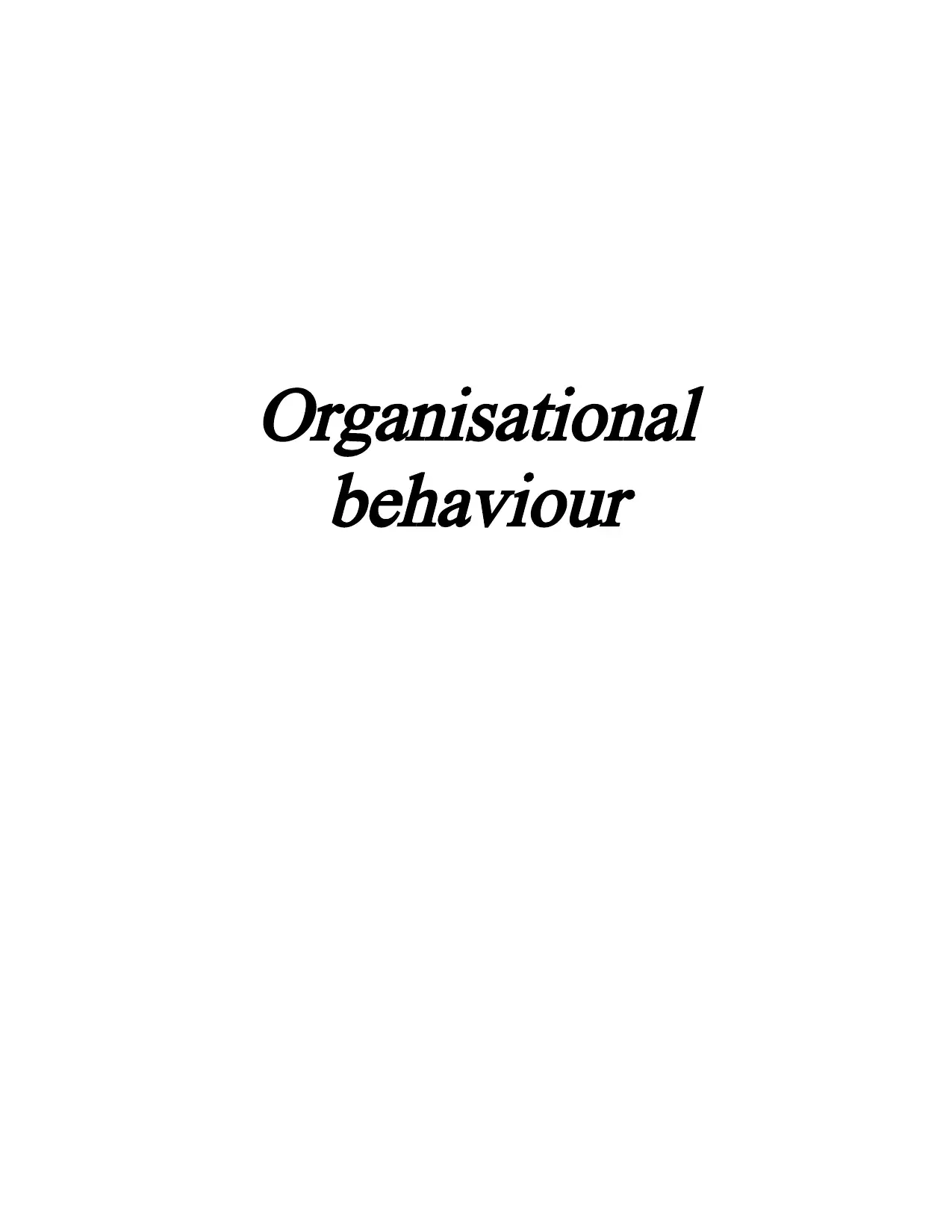
Organisational
behaviour
behaviour
Paraphrase This Document
Need a fresh take? Get an instant paraphrase of this document with our AI Paraphraser
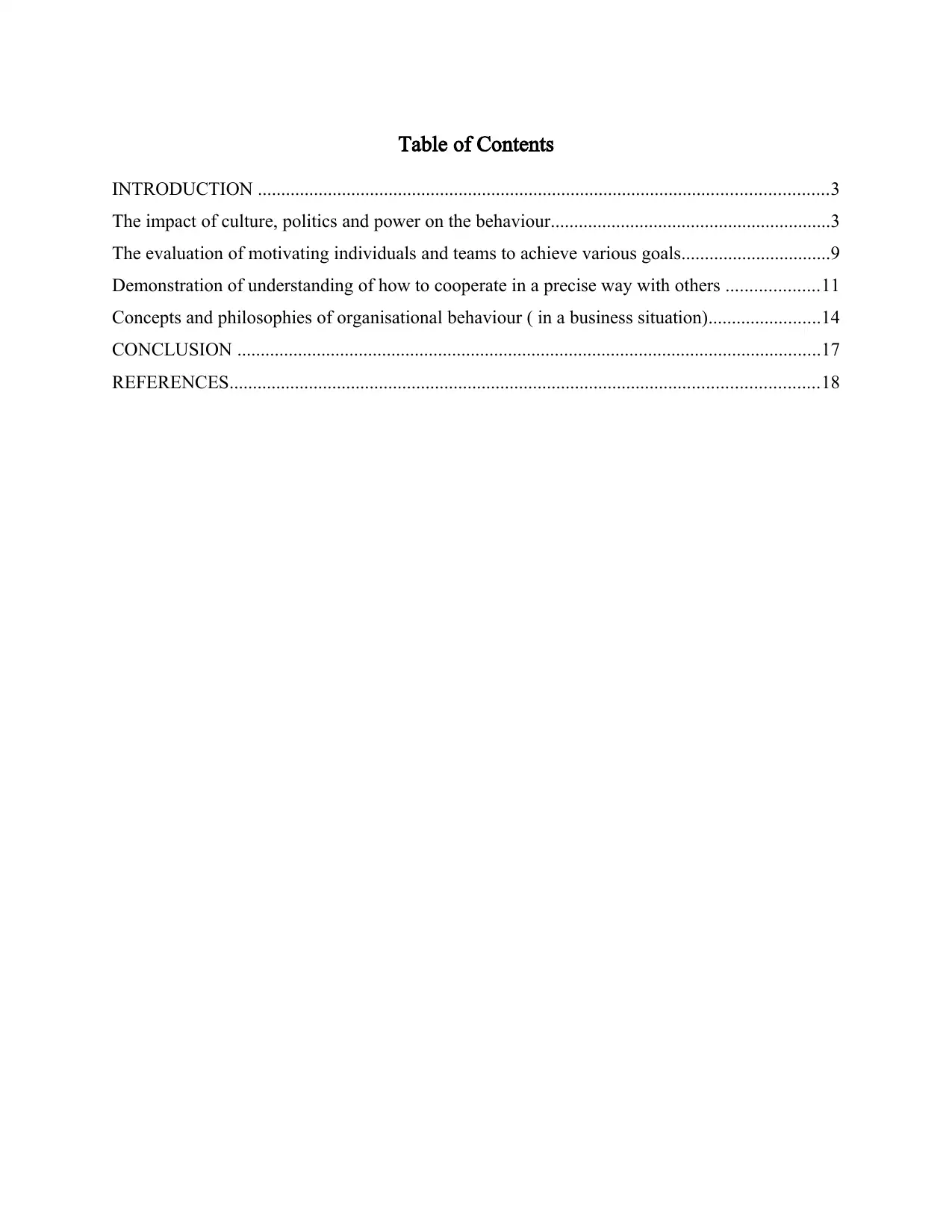
Table of Contents
INTRODUCTION ..........................................................................................................................3
The impact of culture, politics and power on the behaviour............................................................3
The evaluation of motivating individuals and teams to achieve various goals................................9
Demonstration of understanding of how to cooperate in a precise way with others ....................11
Concepts and philosophies of organisational behaviour ( in a business situation)........................14
CONCLUSION .............................................................................................................................17
REFERENCES..............................................................................................................................18
INTRODUCTION ..........................................................................................................................3
The impact of culture, politics and power on the behaviour............................................................3
The evaluation of motivating individuals and teams to achieve various goals................................9
Demonstration of understanding of how to cooperate in a precise way with others ....................11
Concepts and philosophies of organisational behaviour ( in a business situation)........................14
CONCLUSION .............................................................................................................................17
REFERENCES..............................................................................................................................18
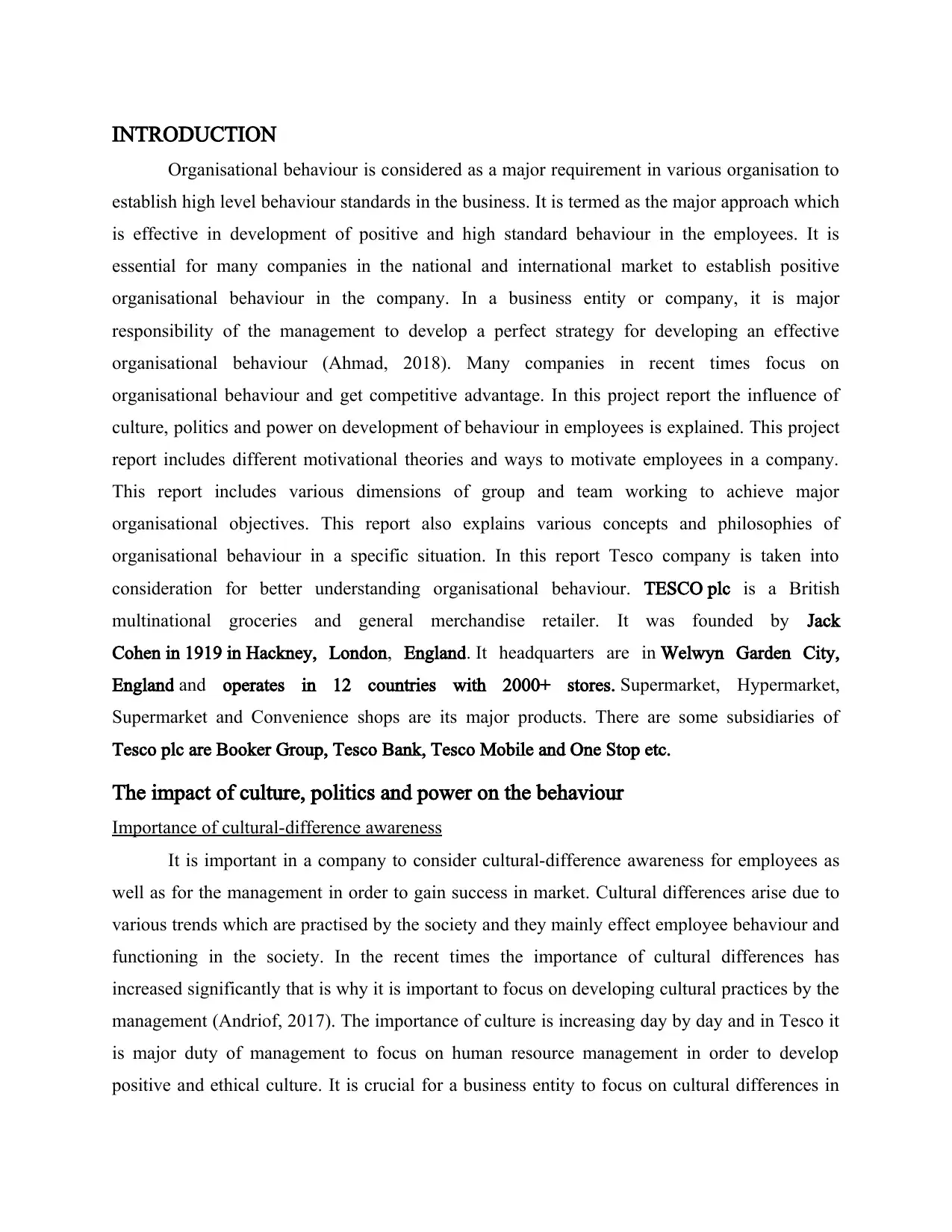
INTRODUCTION
Organisational behaviour is considered as a major requirement in various organisation to
establish high level behaviour standards in the business. It is termed as the major approach which
is effective in development of positive and high standard behaviour in the employees. It is
essential for many companies in the national and international market to establish positive
organisational behaviour in the company. In a business entity or company, it is major
responsibility of the management to develop a perfect strategy for developing an effective
organisational behaviour (Ahmad, 2018). Many companies in recent times focus on
organisational behaviour and get competitive advantage. In this project report the influence of
culture, politics and power on development of behaviour in employees is explained. This project
report includes different motivational theories and ways to motivate employees in a company.
This report includes various dimensions of group and team working to achieve major
organisational objectives. This report also explains various concepts and philosophies of
organisational behaviour in a specific situation. In this report Tesco company is taken into
consideration for better understanding organisational behaviour. TESCO plc is a British
multinational groceries and general merchandise retailer. It was founded by Jack
Cohen in 1919 in Hackney, London, England. It headquarters are in Welwyn Garden City,
England and operates in 12 countries with 2000+ stores. Supermarket, Hypermarket,
Supermarket and Convenience shops are its major products. There are some subsidiaries of
Tesco plc are Booker Group, Tesco Bank, Tesco Mobile and One Stop etc.
The impact of culture, politics and power on the behaviour
Importance of cultural-difference awareness
It is important in a company to consider cultural-difference awareness for employees as
well as for the management in order to gain success in market. Cultural differences arise due to
various trends which are practised by the society and they mainly effect employee behaviour and
functioning in the society. In the recent times the importance of cultural differences has
increased significantly that is why it is important to focus on developing cultural practices by the
management (Andriof, 2017). The importance of culture is increasing day by day and in Tesco it
is major duty of management to focus on human resource management in order to develop
positive and ethical culture. It is crucial for a business entity to focus on cultural differences in
Organisational behaviour is considered as a major requirement in various organisation to
establish high level behaviour standards in the business. It is termed as the major approach which
is effective in development of positive and high standard behaviour in the employees. It is
essential for many companies in the national and international market to establish positive
organisational behaviour in the company. In a business entity or company, it is major
responsibility of the management to develop a perfect strategy for developing an effective
organisational behaviour (Ahmad, 2018). Many companies in recent times focus on
organisational behaviour and get competitive advantage. In this project report the influence of
culture, politics and power on development of behaviour in employees is explained. This project
report includes different motivational theories and ways to motivate employees in a company.
This report includes various dimensions of group and team working to achieve major
organisational objectives. This report also explains various concepts and philosophies of
organisational behaviour in a specific situation. In this report Tesco company is taken into
consideration for better understanding organisational behaviour. TESCO plc is a British
multinational groceries and general merchandise retailer. It was founded by Jack
Cohen in 1919 in Hackney, London, England. It headquarters are in Welwyn Garden City,
England and operates in 12 countries with 2000+ stores. Supermarket, Hypermarket,
Supermarket and Convenience shops are its major products. There are some subsidiaries of
Tesco plc are Booker Group, Tesco Bank, Tesco Mobile and One Stop etc.
The impact of culture, politics and power on the behaviour
Importance of cultural-difference awareness
It is important in a company to consider cultural-difference awareness for employees as
well as for the management in order to gain success in market. Cultural differences arise due to
various trends which are practised by the society and they mainly effect employee behaviour and
functioning in the society. In the recent times the importance of cultural differences has
increased significantly that is why it is important to focus on developing cultural practices by the
management (Andriof, 2017). The importance of culture is increasing day by day and in Tesco it
is major duty of management to focus on human resource management in order to develop
positive and ethical culture. It is crucial for a business entity to focus on cultural differences in
⊘ This is a preview!⊘
Do you want full access?
Subscribe today to unlock all pages.

Trusted by 1+ million students worldwide
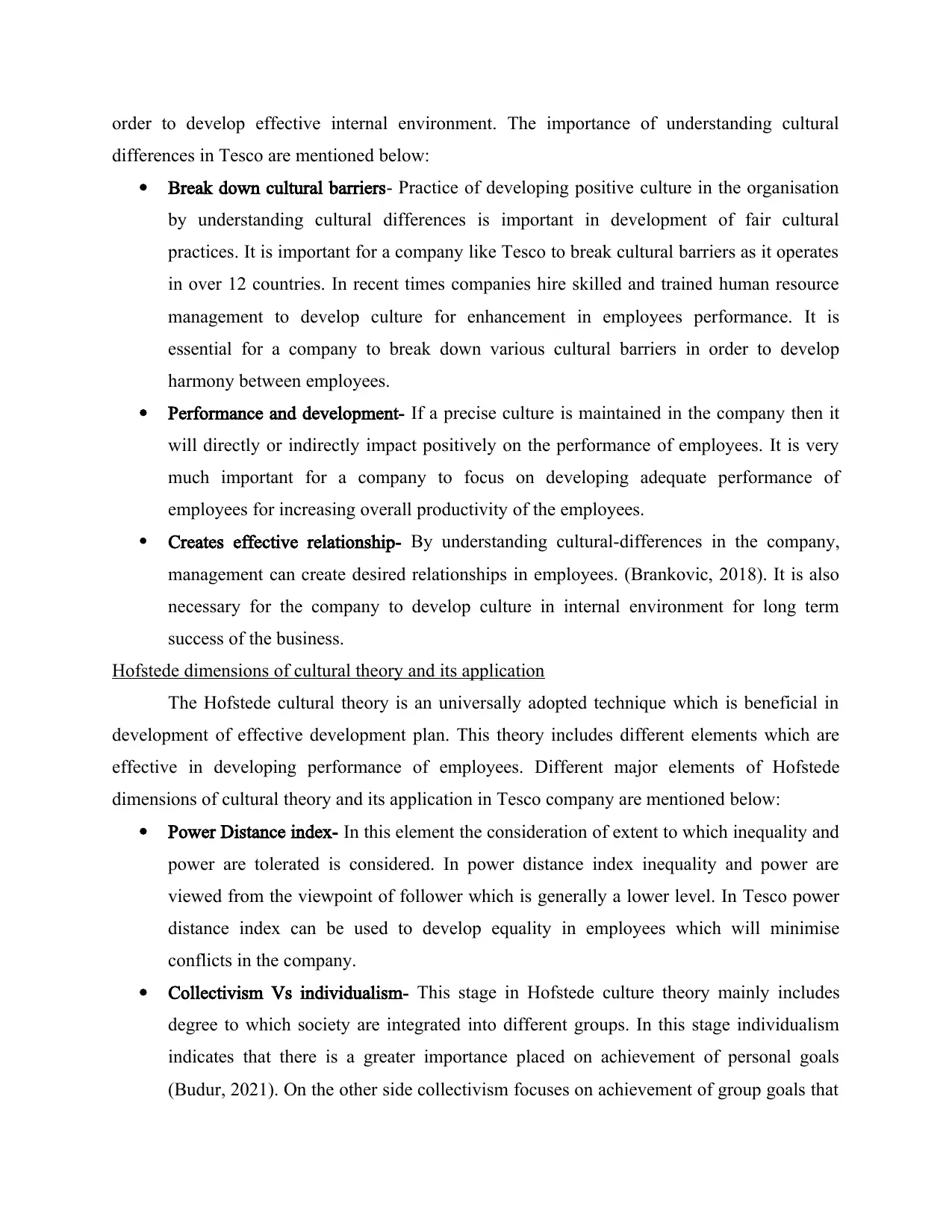
order to develop effective internal environment. The importance of understanding cultural
differences in Tesco are mentioned below:
Break down cultural barriers- Practice of developing positive culture in the organisation
by understanding cultural differences is important in development of fair cultural
practices. It is important for a company like Tesco to break cultural barriers as it operates
in over 12 countries. In recent times companies hire skilled and trained human resource
management to develop culture for enhancement in employees performance. It is
essential for a company to break down various cultural barriers in order to develop
harmony between employees.
Performance and development- If a precise culture is maintained in the company then it
will directly or indirectly impact positively on the performance of employees. It is very
much important for a company to focus on developing adequate performance of
employees for increasing overall productivity of the employees.
Creates effective relationship- By understanding cultural-differences in the company,
management can create desired relationships in employees. (Brankovic, 2018). It is also
necessary for the company to develop culture in internal environment for long term
success of the business.
Hofstede dimensions of cultural theory and its application
The Hofstede cultural theory is an universally adopted technique which is beneficial in
development of effective development plan. This theory includes different elements which are
effective in developing performance of employees. Different major elements of Hofstede
dimensions of cultural theory and its application in Tesco company are mentioned below:
Power Distance index- In this element the consideration of extent to which inequality and
power are tolerated is considered. In power distance index inequality and power are
viewed from the viewpoint of follower which is generally a lower level. In Tesco power
distance index can be used to develop equality in employees which will minimise
conflicts in the company.
Collectivism Vs individualism- This stage in Hofstede culture theory mainly includes
degree to which society are integrated into different groups. In this stage individualism
indicates that there is a greater importance placed on achievement of personal goals
(Budur, 2021). On the other side collectivism focuses on achievement of group goals that
differences in Tesco are mentioned below:
Break down cultural barriers- Practice of developing positive culture in the organisation
by understanding cultural differences is important in development of fair cultural
practices. It is important for a company like Tesco to break cultural barriers as it operates
in over 12 countries. In recent times companies hire skilled and trained human resource
management to develop culture for enhancement in employees performance. It is
essential for a company to break down various cultural barriers in order to develop
harmony between employees.
Performance and development- If a precise culture is maintained in the company then it
will directly or indirectly impact positively on the performance of employees. It is very
much important for a company to focus on developing adequate performance of
employees for increasing overall productivity of the employees.
Creates effective relationship- By understanding cultural-differences in the company,
management can create desired relationships in employees. (Brankovic, 2018). It is also
necessary for the company to develop culture in internal environment for long term
success of the business.
Hofstede dimensions of cultural theory and its application
The Hofstede cultural theory is an universally adopted technique which is beneficial in
development of effective development plan. This theory includes different elements which are
effective in developing performance of employees. Different major elements of Hofstede
dimensions of cultural theory and its application in Tesco company are mentioned below:
Power Distance index- In this element the consideration of extent to which inequality and
power are tolerated is considered. In power distance index inequality and power are
viewed from the viewpoint of follower which is generally a lower level. In Tesco power
distance index can be used to develop equality in employees which will minimise
conflicts in the company.
Collectivism Vs individualism- This stage in Hofstede culture theory mainly includes
degree to which society are integrated into different groups. In this stage individualism
indicates that there is a greater importance placed on achievement of personal goals
(Budur, 2021). On the other side collectivism focuses on achievement of group goals that
Paraphrase This Document
Need a fresh take? Get an instant paraphrase of this document with our AI Paraphraser
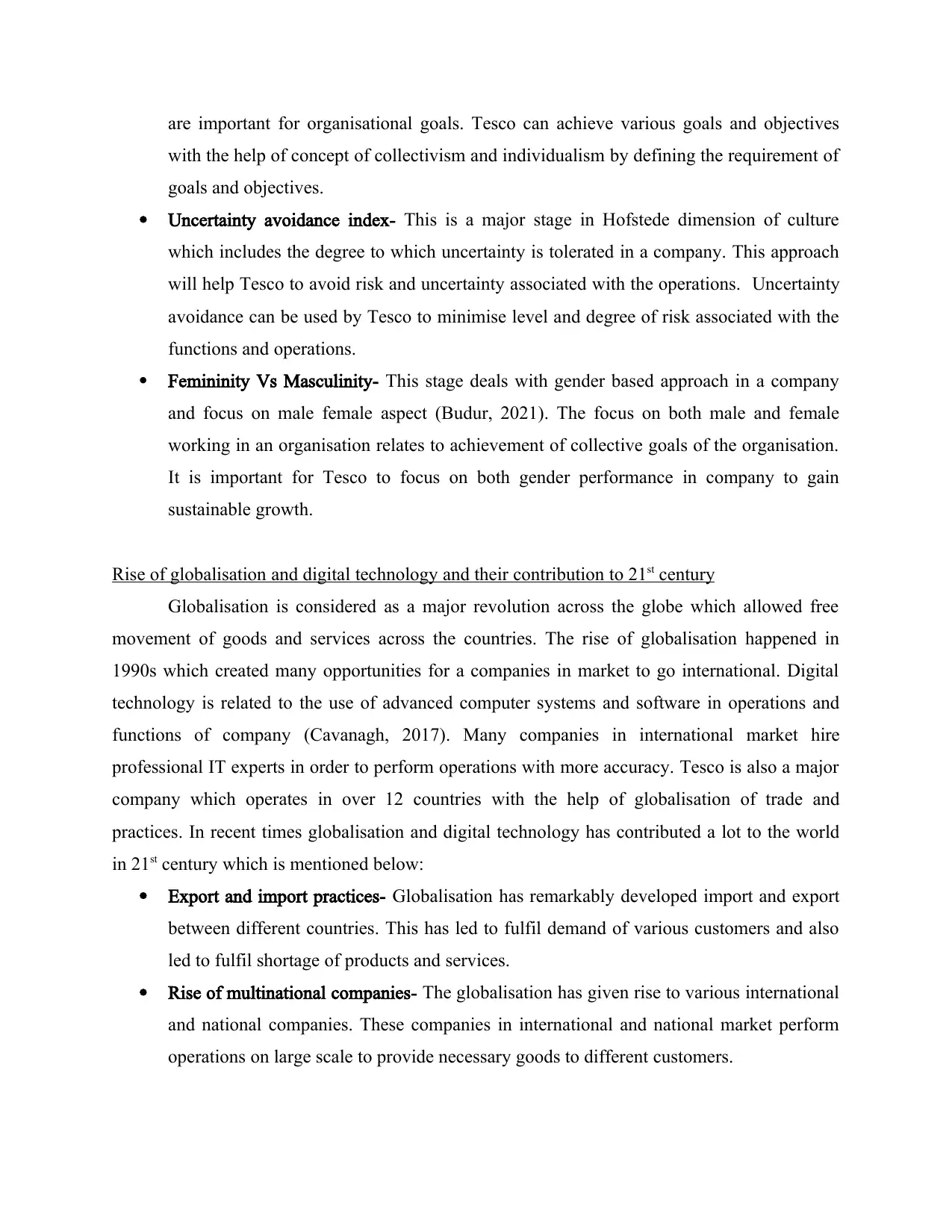
are important for organisational goals. Tesco can achieve various goals and objectives
with the help of concept of collectivism and individualism by defining the requirement of
goals and objectives.
Uncertainty avoidance index- This is a major stage in Hofstede dimension of culture
which includes the degree to which uncertainty is tolerated in a company. This approach
will help Tesco to avoid risk and uncertainty associated with the operations. Uncertainty
avoidance can be used by Tesco to minimise level and degree of risk associated with the
functions and operations.
Femininity Vs Masculinity- This stage deals with gender based approach in a company
and focus on male female aspect (Budur, 2021). The focus on both male and female
working in an organisation relates to achievement of collective goals of the organisation.
It is important for Tesco to focus on both gender performance in company to gain
sustainable growth.
Rise of globalisation and digital technology and their contribution to 21st century
Globalisation is considered as a major revolution across the globe which allowed free
movement of goods and services across the countries. The rise of globalisation happened in
1990s which created many opportunities for a companies in market to go international. Digital
technology is related to the use of advanced computer systems and software in operations and
functions of company (Cavanagh, 2017). Many companies in international market hire
professional IT experts in order to perform operations with more accuracy. Tesco is also a major
company which operates in over 12 countries with the help of globalisation of trade and
practices. In recent times globalisation and digital technology has contributed a lot to the world
in 21st century which is mentioned below:
Export and import practices- Globalisation has remarkably developed import and export
between different countries. This has led to fulfil demand of various customers and also
led to fulfil shortage of products and services.
Rise of multinational companies- The globalisation has given rise to various international
and national companies. These companies in international and national market perform
operations on large scale to provide necessary goods to different customers.
with the help of concept of collectivism and individualism by defining the requirement of
goals and objectives.
Uncertainty avoidance index- This is a major stage in Hofstede dimension of culture
which includes the degree to which uncertainty is tolerated in a company. This approach
will help Tesco to avoid risk and uncertainty associated with the operations. Uncertainty
avoidance can be used by Tesco to minimise level and degree of risk associated with the
functions and operations.
Femininity Vs Masculinity- This stage deals with gender based approach in a company
and focus on male female aspect (Budur, 2021). The focus on both male and female
working in an organisation relates to achievement of collective goals of the organisation.
It is important for Tesco to focus on both gender performance in company to gain
sustainable growth.
Rise of globalisation and digital technology and their contribution to 21st century
Globalisation is considered as a major revolution across the globe which allowed free
movement of goods and services across the countries. The rise of globalisation happened in
1990s which created many opportunities for a companies in market to go international. Digital
technology is related to the use of advanced computer systems and software in operations and
functions of company (Cavanagh, 2017). Many companies in international market hire
professional IT experts in order to perform operations with more accuracy. Tesco is also a major
company which operates in over 12 countries with the help of globalisation of trade and
practices. In recent times globalisation and digital technology has contributed a lot to the world
in 21st century which is mentioned below:
Export and import practices- Globalisation has remarkably developed import and export
between different countries. This has led to fulfil demand of various customers and also
led to fulfil shortage of products and services.
Rise of multinational companies- The globalisation has given rise to various international
and national companies. These companies in international and national market perform
operations on large scale to provide necessary goods to different customers.
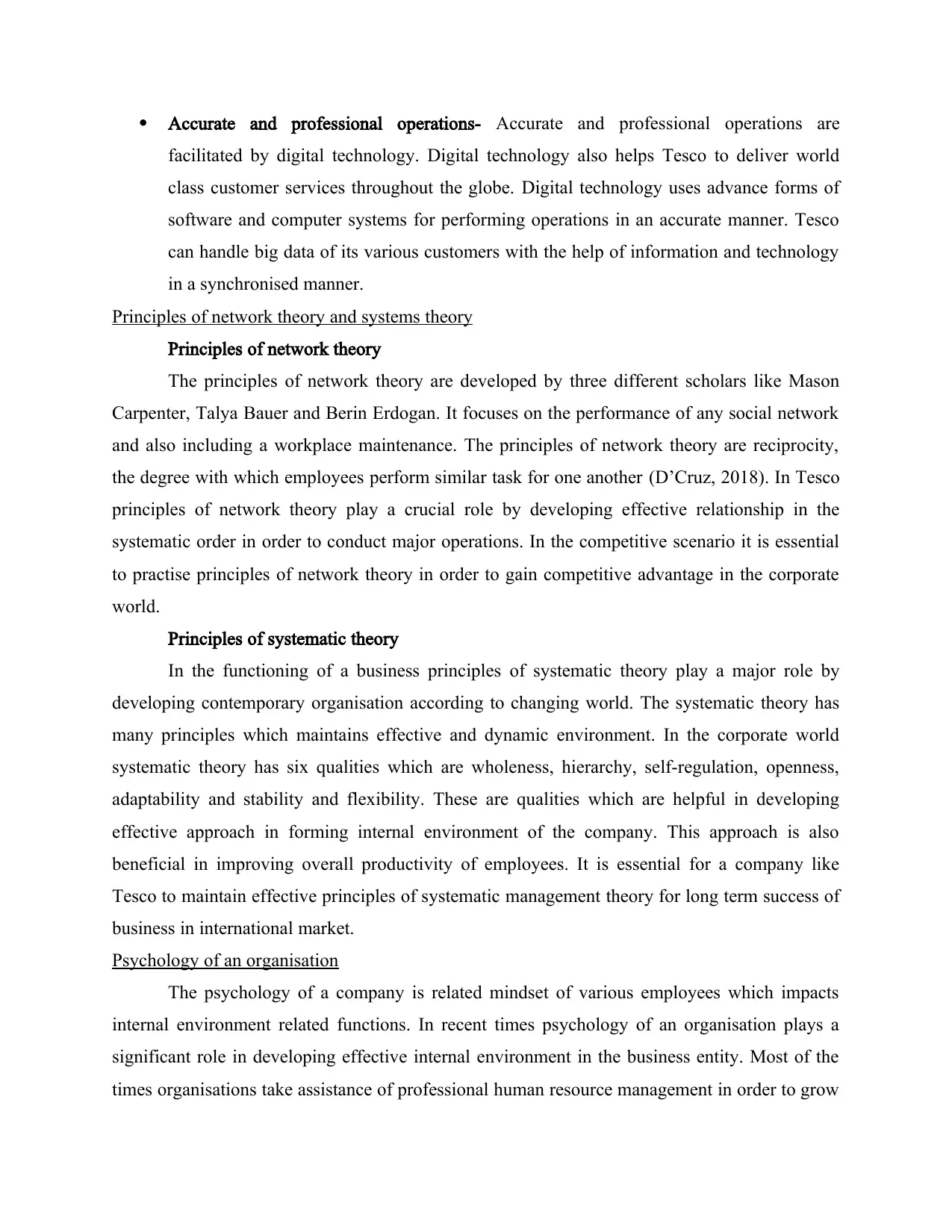
Accurate and professional operations- Accurate and professional operations are
facilitated by digital technology. Digital technology also helps Tesco to deliver world
class customer services throughout the globe. Digital technology uses advance forms of
software and computer systems for performing operations in an accurate manner. Tesco
can handle big data of its various customers with the help of information and technology
in a synchronised manner.
Principles of network theory and systems theory
Principles of network theory
The principles of network theory are developed by three different scholars like Mason
Carpenter, Talya Bauer and Berin Erdogan. It focuses on the performance of any social network
and also including a workplace maintenance. The principles of network theory are reciprocity,
the degree with which employees perform similar task for one another (D’Cruz, 2018). In Tesco
principles of network theory play a crucial role by developing effective relationship in the
systematic order in order to conduct major operations. In the competitive scenario it is essential
to practise principles of network theory in order to gain competitive advantage in the corporate
world.
Principles of systematic theory
In the functioning of a business principles of systematic theory play a major role by
developing contemporary organisation according to changing world. The systematic theory has
many principles which maintains effective and dynamic environment. In the corporate world
systematic theory has six qualities which are wholeness, hierarchy, self-regulation, openness,
adaptability and stability and flexibility. These are qualities which are helpful in developing
effective approach in forming internal environment of the company. This approach is also
beneficial in improving overall productivity of employees. It is essential for a company like
Tesco to maintain effective principles of systematic management theory for long term success of
business in international market.
Psychology of an organisation
The psychology of a company is related mindset of various employees which impacts
internal environment related functions. In recent times psychology of an organisation plays a
significant role in developing effective internal environment in the business entity. Most of the
times organisations take assistance of professional human resource management in order to grow
facilitated by digital technology. Digital technology also helps Tesco to deliver world
class customer services throughout the globe. Digital technology uses advance forms of
software and computer systems for performing operations in an accurate manner. Tesco
can handle big data of its various customers with the help of information and technology
in a synchronised manner.
Principles of network theory and systems theory
Principles of network theory
The principles of network theory are developed by three different scholars like Mason
Carpenter, Talya Bauer and Berin Erdogan. It focuses on the performance of any social network
and also including a workplace maintenance. The principles of network theory are reciprocity,
the degree with which employees perform similar task for one another (D’Cruz, 2018). In Tesco
principles of network theory play a crucial role by developing effective relationship in the
systematic order in order to conduct major operations. In the competitive scenario it is essential
to practise principles of network theory in order to gain competitive advantage in the corporate
world.
Principles of systematic theory
In the functioning of a business principles of systematic theory play a major role by
developing contemporary organisation according to changing world. The systematic theory has
many principles which maintains effective and dynamic environment. In the corporate world
systematic theory has six qualities which are wholeness, hierarchy, self-regulation, openness,
adaptability and stability and flexibility. These are qualities which are helpful in developing
effective approach in forming internal environment of the company. This approach is also
beneficial in improving overall productivity of employees. It is essential for a company like
Tesco to maintain effective principles of systematic management theory for long term success of
business in international market.
Psychology of an organisation
The psychology of a company is related mindset of various employees which impacts
internal environment related functions. In recent times psychology of an organisation plays a
significant role in developing effective internal environment in the business entity. Most of the
times organisations take assistance of professional human resource management in order to grow
⊘ This is a preview!⊘
Do you want full access?
Subscribe today to unlock all pages.

Trusted by 1+ million students worldwide
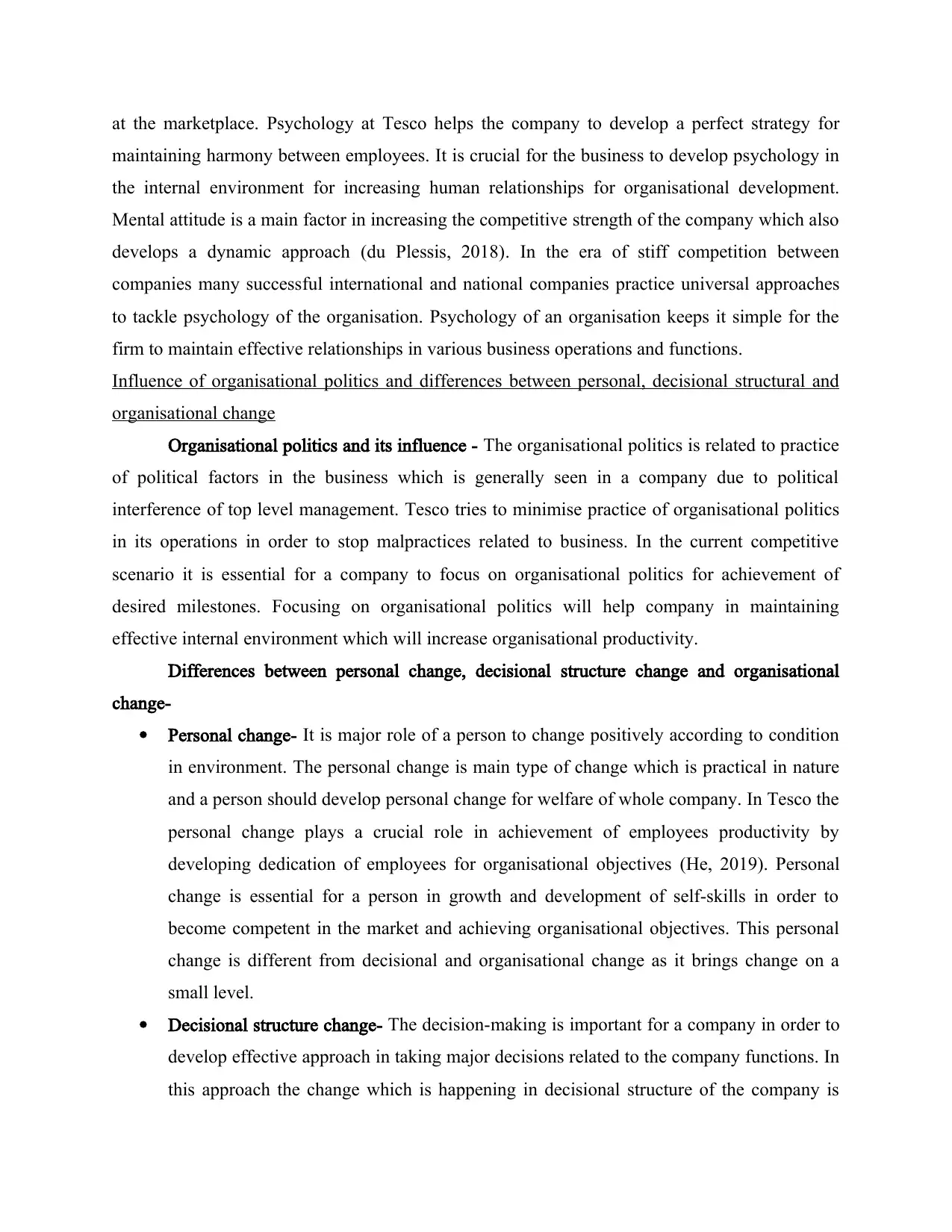
at the marketplace. Psychology at Tesco helps the company to develop a perfect strategy for
maintaining harmony between employees. It is crucial for the business to develop psychology in
the internal environment for increasing human relationships for organisational development.
Mental attitude is a main factor in increasing the competitive strength of the company which also
develops a dynamic approach (du Plessis, 2018). In the era of stiff competition between
companies many successful international and national companies practice universal approaches
to tackle psychology of the organisation. Psychology of an organisation keeps it simple for the
firm to maintain effective relationships in various business operations and functions.
Influence of organisational politics and differences between personal, decisional structural and
organisational change
Organisational politics and its influence - The organisational politics is related to practice
of political factors in the business which is generally seen in a company due to political
interference of top level management. Tesco tries to minimise practice of organisational politics
in its operations in order to stop malpractices related to business. In the current competitive
scenario it is essential for a company to focus on organisational politics for achievement of
desired milestones. Focusing on organisational politics will help company in maintaining
effective internal environment which will increase organisational productivity.
Differences between personal change, decisional structure change and organisational
change-
Personal change- It is major role of a person to change positively according to condition
in environment. The personal change is main type of change which is practical in nature
and a person should develop personal change for welfare of whole company. In Tesco the
personal change plays a crucial role in achievement of employees productivity by
developing dedication of employees for organisational objectives (He, 2019). Personal
change is essential for a person in growth and development of self-skills in order to
become competent in the market and achieving organisational objectives. This personal
change is different from decisional and organisational change as it brings change on a
small level.
Decisional structure change- The decision-making is important for a company in order to
develop effective approach in taking major decisions related to the company functions. In
this approach the change which is happening in decisional structure of the company is
maintaining harmony between employees. It is crucial for the business to develop psychology in
the internal environment for increasing human relationships for organisational development.
Mental attitude is a main factor in increasing the competitive strength of the company which also
develops a dynamic approach (du Plessis, 2018). In the era of stiff competition between
companies many successful international and national companies practice universal approaches
to tackle psychology of the organisation. Psychology of an organisation keeps it simple for the
firm to maintain effective relationships in various business operations and functions.
Influence of organisational politics and differences between personal, decisional structural and
organisational change
Organisational politics and its influence - The organisational politics is related to practice
of political factors in the business which is generally seen in a company due to political
interference of top level management. Tesco tries to minimise practice of organisational politics
in its operations in order to stop malpractices related to business. In the current competitive
scenario it is essential for a company to focus on organisational politics for achievement of
desired milestones. Focusing on organisational politics will help company in maintaining
effective internal environment which will increase organisational productivity.
Differences between personal change, decisional structure change and organisational
change-
Personal change- It is major role of a person to change positively according to condition
in environment. The personal change is main type of change which is practical in nature
and a person should develop personal change for welfare of whole company. In Tesco the
personal change plays a crucial role in achievement of employees productivity by
developing dedication of employees for organisational objectives (He, 2019). Personal
change is essential for a person in growth and development of self-skills in order to
become competent in the market and achieving organisational objectives. This personal
change is different from decisional and organisational change as it brings change on a
small level.
Decisional structure change- The decision-making is important for a company in order to
develop effective approach in taking major decisions related to the company functions. In
this approach the change which is happening in decisional structure of the company is
Paraphrase This Document
Need a fresh take? Get an instant paraphrase of this document with our AI Paraphraser
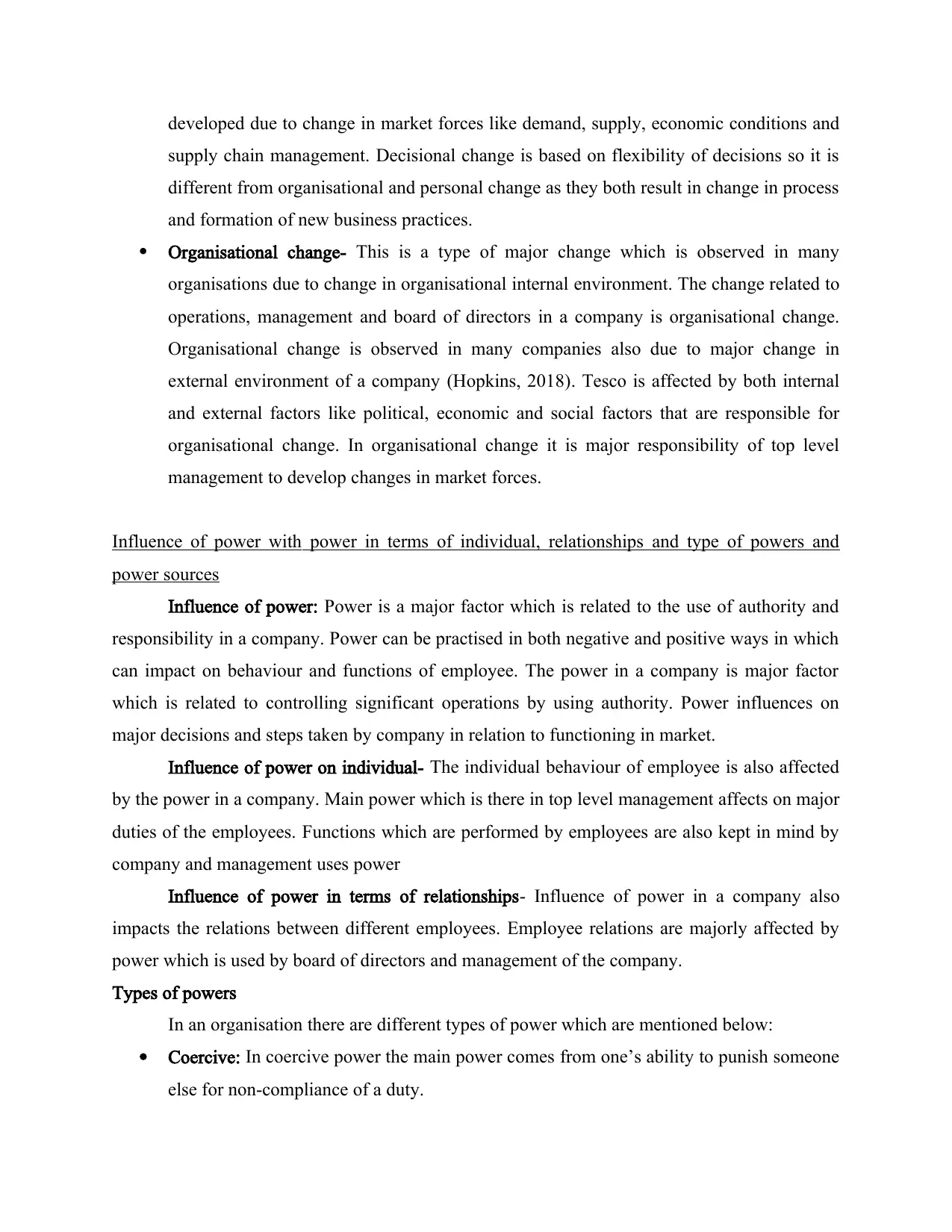
developed due to change in market forces like demand, supply, economic conditions and
supply chain management. Decisional change is based on flexibility of decisions so it is
different from organisational and personal change as they both result in change in process
and formation of new business practices.
Organisational change- This is a type of major change which is observed in many
organisations due to change in organisational internal environment. The change related to
operations, management and board of directors in a company is organisational change.
Organisational change is observed in many companies also due to major change in
external environment of a company (Hopkins, 2018). Tesco is affected by both internal
and external factors like political, economic and social factors that are responsible for
organisational change. In organisational change it is major responsibility of top level
management to develop changes in market forces.
Influence of power with power in terms of individual, relationships and type of powers and
power sources
Influence of power: Power is a major factor which is related to the use of authority and
responsibility in a company. Power can be practised in both negative and positive ways in which
can impact on behaviour and functions of employee. The power in a company is major factor
which is related to controlling significant operations by using authority. Power influences on
major decisions and steps taken by company in relation to functioning in market.
Influence of power on individual- The individual behaviour of employee is also affected
by the power in a company. Main power which is there in top level management affects on major
duties of the employees. Functions which are performed by employees are also kept in mind by
company and management uses power
Influence of power in terms of relationships- Influence of power in a company also
impacts the relations between different employees. Employee relations are majorly affected by
power which is used by board of directors and management of the company.
Types of powers
In an organisation there are different types of power which are mentioned below:
Coercive: In coercive power the main power comes from one’s ability to punish someone
else for non-compliance of a duty.
supply chain management. Decisional change is based on flexibility of decisions so it is
different from organisational and personal change as they both result in change in process
and formation of new business practices.
Organisational change- This is a type of major change which is observed in many
organisations due to change in organisational internal environment. The change related to
operations, management and board of directors in a company is organisational change.
Organisational change is observed in many companies also due to major change in
external environment of a company (Hopkins, 2018). Tesco is affected by both internal
and external factors like political, economic and social factors that are responsible for
organisational change. In organisational change it is major responsibility of top level
management to develop changes in market forces.
Influence of power with power in terms of individual, relationships and type of powers and
power sources
Influence of power: Power is a major factor which is related to the use of authority and
responsibility in a company. Power can be practised in both negative and positive ways in which
can impact on behaviour and functions of employee. The power in a company is major factor
which is related to controlling significant operations by using authority. Power influences on
major decisions and steps taken by company in relation to functioning in market.
Influence of power on individual- The individual behaviour of employee is also affected
by the power in a company. Main power which is there in top level management affects on major
duties of the employees. Functions which are performed by employees are also kept in mind by
company and management uses power
Influence of power in terms of relationships- Influence of power in a company also
impacts the relations between different employees. Employee relations are majorly affected by
power which is used by board of directors and management of the company.
Types of powers
In an organisation there are different types of power which are mentioned below:
Coercive: In coercive power the main power comes from one’s ability to punish someone
else for non-compliance of a duty.
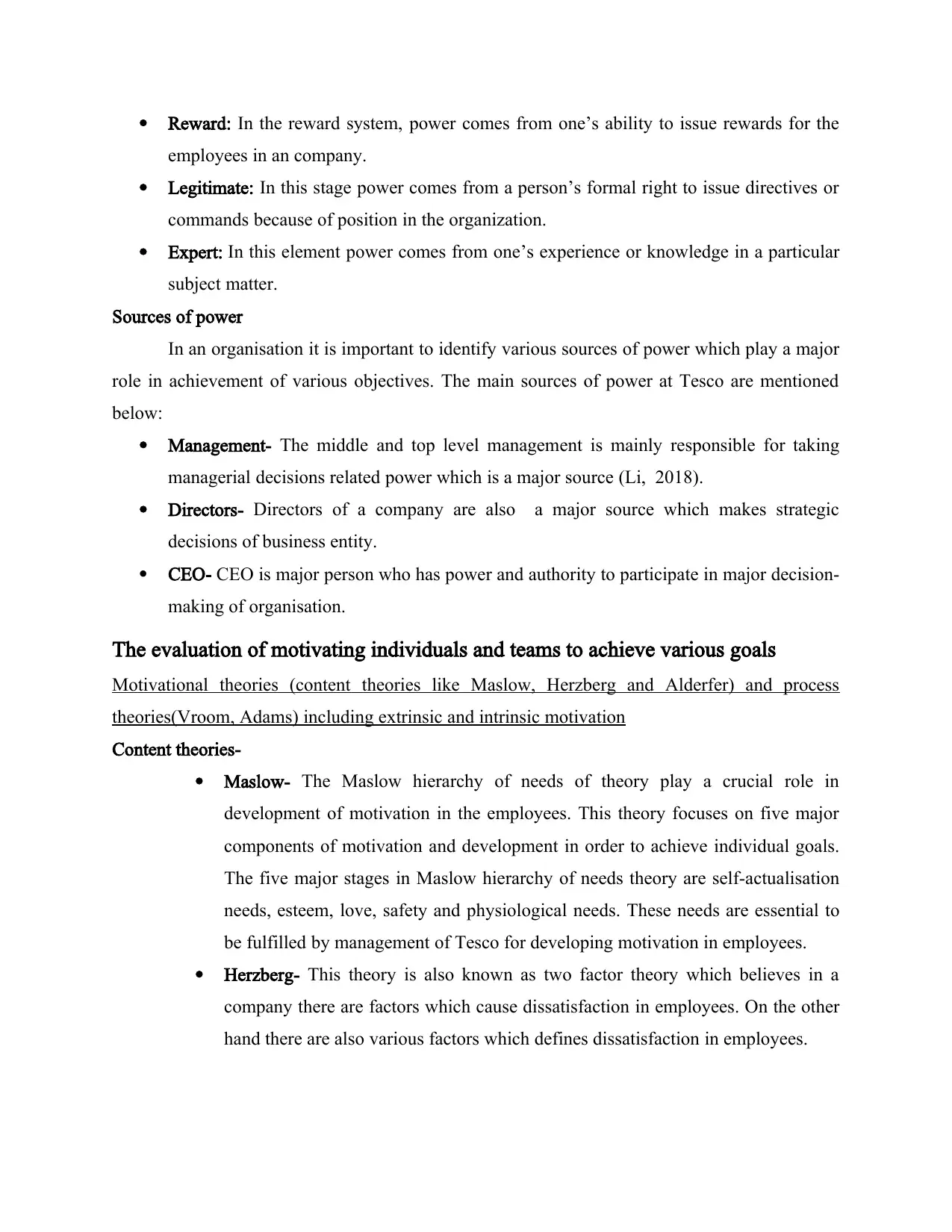
Reward: In the reward system, power comes from one’s ability to issue rewards for the
employees in an company.
Legitimate: In this stage power comes from a person’s formal right to issue directives or
commands because of position in the organization.
Expert: In this element power comes from one’s experience or knowledge in a particular
subject matter.
Sources of power
In an organisation it is important to identify various sources of power which play a major
role in achievement of various objectives. The main sources of power at Tesco are mentioned
below:
Management- The middle and top level management is mainly responsible for taking
managerial decisions related power which is a major source (Li, 2018).
Directors- Directors of a company are also a major source which makes strategic
decisions of business entity.
CEO- CEO is major person who has power and authority to participate in major decision-
making of organisation.
The evaluation of motivating individuals and teams to achieve various goals
Motivational theories (content theories like Maslow, Herzberg and Alderfer) and process
theories(Vroom, Adams) including extrinsic and intrinsic motivation
Content theories-
Maslow- The Maslow hierarchy of needs of theory play a crucial role in
development of motivation in the employees. This theory focuses on five major
components of motivation and development in order to achieve individual goals.
The five major stages in Maslow hierarchy of needs theory are self-actualisation
needs, esteem, love, safety and physiological needs. These needs are essential to
be fulfilled by management of Tesco for developing motivation in employees.
Herzberg- This theory is also known as two factor theory which believes in a
company there are factors which cause dissatisfaction in employees. On the other
hand there are also various factors which defines dissatisfaction in employees.
employees in an company.
Legitimate: In this stage power comes from a person’s formal right to issue directives or
commands because of position in the organization.
Expert: In this element power comes from one’s experience or knowledge in a particular
subject matter.
Sources of power
In an organisation it is important to identify various sources of power which play a major
role in achievement of various objectives. The main sources of power at Tesco are mentioned
below:
Management- The middle and top level management is mainly responsible for taking
managerial decisions related power which is a major source (Li, 2018).
Directors- Directors of a company are also a major source which makes strategic
decisions of business entity.
CEO- CEO is major person who has power and authority to participate in major decision-
making of organisation.
The evaluation of motivating individuals and teams to achieve various goals
Motivational theories (content theories like Maslow, Herzberg and Alderfer) and process
theories(Vroom, Adams) including extrinsic and intrinsic motivation
Content theories-
Maslow- The Maslow hierarchy of needs of theory play a crucial role in
development of motivation in the employees. This theory focuses on five major
components of motivation and development in order to achieve individual goals.
The five major stages in Maslow hierarchy of needs theory are self-actualisation
needs, esteem, love, safety and physiological needs. These needs are essential to
be fulfilled by management of Tesco for developing motivation in employees.
Herzberg- This theory is also known as two factor theory which believes in a
company there are factors which cause dissatisfaction in employees. On the other
hand there are also various factors which defines dissatisfaction in employees.
⊘ This is a preview!⊘
Do you want full access?
Subscribe today to unlock all pages.

Trusted by 1+ million students worldwide
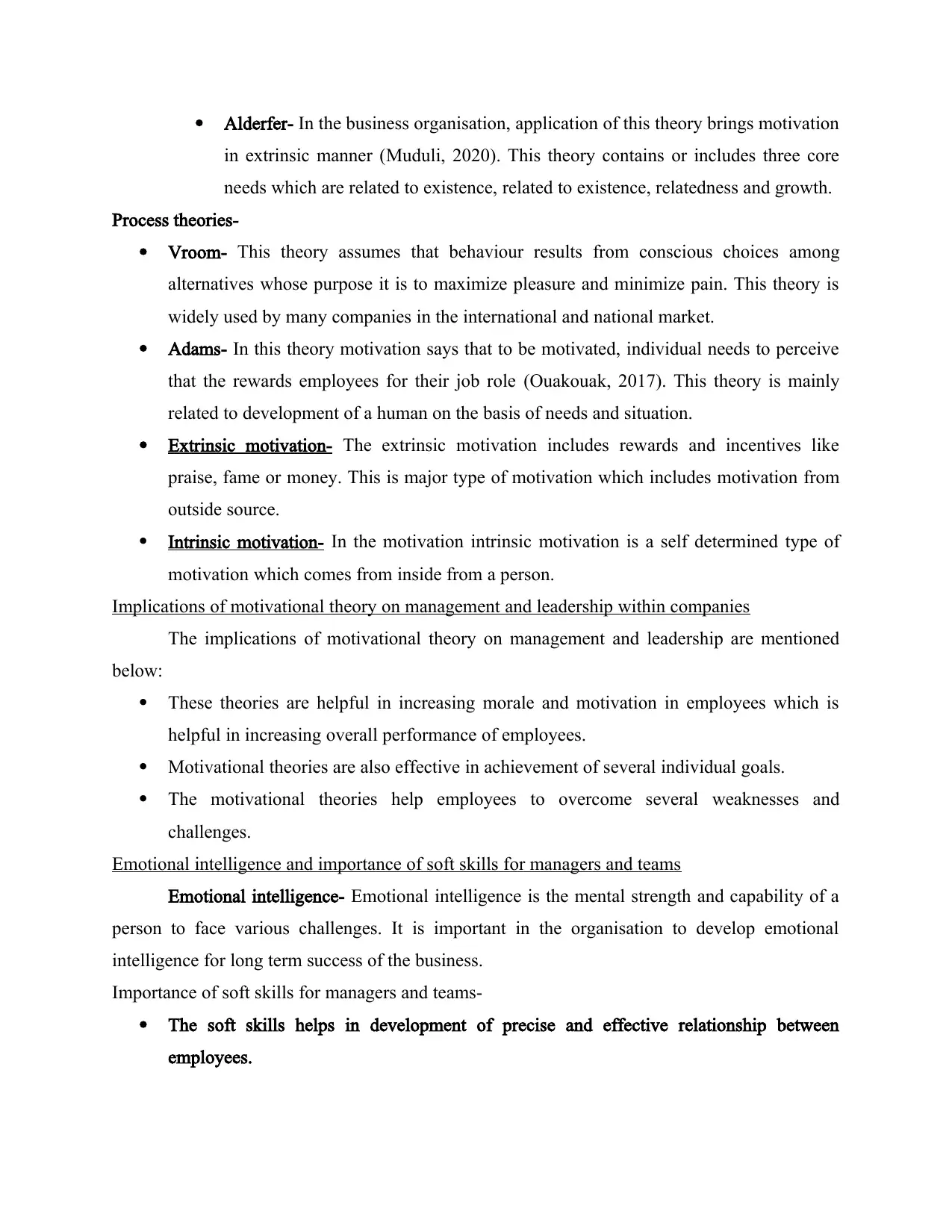
Alderfer- In the business organisation, application of this theory brings motivation
in extrinsic manner (Muduli, 2020). This theory contains or includes three core
needs which are related to existence, related to existence, relatedness and growth.
Process theories-
Vroom- This theory assumes that behaviour results from conscious choices among
alternatives whose purpose it is to maximize pleasure and minimize pain. This theory is
widely used by many companies in the international and national market.
Adams- In this theory motivation says that to be motivated, individual needs to perceive
that the rewards employees for their job role (Ouakouak, 2017). This theory is mainly
related to development of a human on the basis of needs and situation.
Extrinsic motivation- The extrinsic motivation includes rewards and incentives like
praise, fame or money. This is major type of motivation which includes motivation from
outside source.
Intrinsic motivation- In the motivation intrinsic motivation is a self determined type of
motivation which comes from inside from a person.
Implications of motivational theory on management and leadership within companies
The implications of motivational theory on management and leadership are mentioned
below:
These theories are helpful in increasing morale and motivation in employees which is
helpful in increasing overall performance of employees.
Motivational theories are also effective in achievement of several individual goals.
The motivational theories help employees to overcome several weaknesses and
challenges.
Emotional intelligence and importance of soft skills for managers and teams
Emotional intelligence- Emotional intelligence is the mental strength and capability of a
person to face various challenges. It is important in the organisation to develop emotional
intelligence for long term success of the business.
Importance of soft skills for managers and teams-
The soft skills helps in development of precise and effective relationship between
employees.
in extrinsic manner (Muduli, 2020). This theory contains or includes three core
needs which are related to existence, related to existence, relatedness and growth.
Process theories-
Vroom- This theory assumes that behaviour results from conscious choices among
alternatives whose purpose it is to maximize pleasure and minimize pain. This theory is
widely used by many companies in the international and national market.
Adams- In this theory motivation says that to be motivated, individual needs to perceive
that the rewards employees for their job role (Ouakouak, 2017). This theory is mainly
related to development of a human on the basis of needs and situation.
Extrinsic motivation- The extrinsic motivation includes rewards and incentives like
praise, fame or money. This is major type of motivation which includes motivation from
outside source.
Intrinsic motivation- In the motivation intrinsic motivation is a self determined type of
motivation which comes from inside from a person.
Implications of motivational theory on management and leadership within companies
The implications of motivational theory on management and leadership are mentioned
below:
These theories are helpful in increasing morale and motivation in employees which is
helpful in increasing overall performance of employees.
Motivational theories are also effective in achievement of several individual goals.
The motivational theories help employees to overcome several weaknesses and
challenges.
Emotional intelligence and importance of soft skills for managers and teams
Emotional intelligence- Emotional intelligence is the mental strength and capability of a
person to face various challenges. It is important in the organisation to develop emotional
intelligence for long term success of the business.
Importance of soft skills for managers and teams-
The soft skills helps in development of precise and effective relationship between
employees.
Paraphrase This Document
Need a fresh take? Get an instant paraphrase of this document with our AI Paraphraser
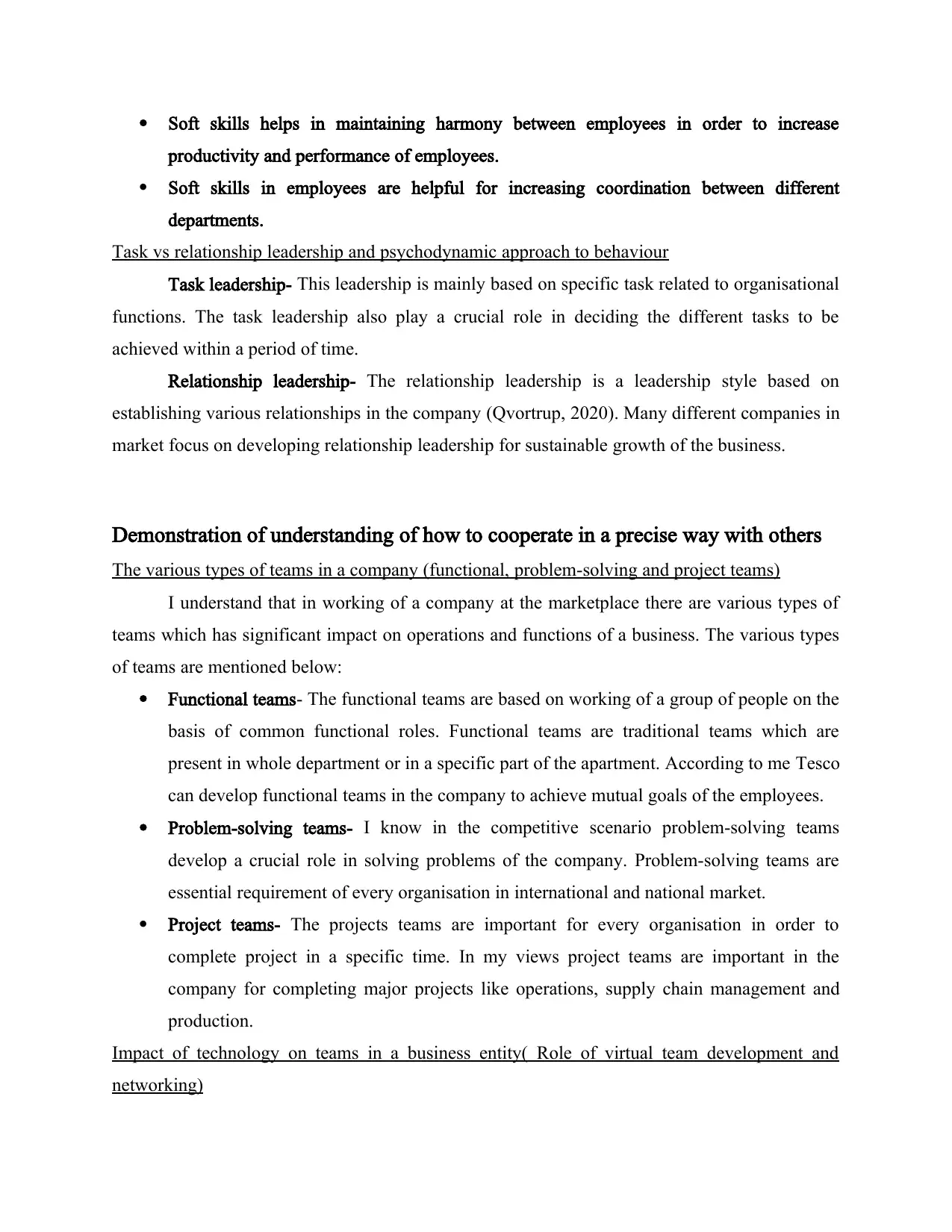
Soft skills helps in maintaining harmony between employees in order to increase
productivity and performance of employees.
Soft skills in employees are helpful for increasing coordination between different
departments.
Task vs relationship leadership and psychodynamic approach to behaviour
Task leadership- This leadership is mainly based on specific task related to organisational
functions. The task leadership also play a crucial role in deciding the different tasks to be
achieved within a period of time.
Relationship leadership- The relationship leadership is a leadership style based on
establishing various relationships in the company (Qvortrup, 2020). Many different companies in
market focus on developing relationship leadership for sustainable growth of the business.
Demonstration of understanding of how to cooperate in a precise way with others
The various types of teams in a company (functional, problem-solving and project teams)
I understand that in working of a company at the marketplace there are various types of
teams which has significant impact on operations and functions of a business. The various types
of teams are mentioned below:
Functional teams- The functional teams are based on working of a group of people on the
basis of common functional roles. Functional teams are traditional teams which are
present in whole department or in a specific part of the apartment. According to me Tesco
can develop functional teams in the company to achieve mutual goals of the employees.
Problem-solving teams- I know in the competitive scenario problem-solving teams
develop a crucial role in solving problems of the company. Problem-solving teams are
essential requirement of every organisation in international and national market.
Project teams- The projects teams are important for every organisation in order to
complete project in a specific time. In my views project teams are important in the
company for completing major projects like operations, supply chain management and
production.
Impact of technology on teams in a business entity( Role of virtual team development and
networking)
productivity and performance of employees.
Soft skills in employees are helpful for increasing coordination between different
departments.
Task vs relationship leadership and psychodynamic approach to behaviour
Task leadership- This leadership is mainly based on specific task related to organisational
functions. The task leadership also play a crucial role in deciding the different tasks to be
achieved within a period of time.
Relationship leadership- The relationship leadership is a leadership style based on
establishing various relationships in the company (Qvortrup, 2020). Many different companies in
market focus on developing relationship leadership for sustainable growth of the business.
Demonstration of understanding of how to cooperate in a precise way with others
The various types of teams in a company (functional, problem-solving and project teams)
I understand that in working of a company at the marketplace there are various types of
teams which has significant impact on operations and functions of a business. The various types
of teams are mentioned below:
Functional teams- The functional teams are based on working of a group of people on the
basis of common functional roles. Functional teams are traditional teams which are
present in whole department or in a specific part of the apartment. According to me Tesco
can develop functional teams in the company to achieve mutual goals of the employees.
Problem-solving teams- I know in the competitive scenario problem-solving teams
develop a crucial role in solving problems of the company. Problem-solving teams are
essential requirement of every organisation in international and national market.
Project teams- The projects teams are important for every organisation in order to
complete project in a specific time. In my views project teams are important in the
company for completing major projects like operations, supply chain management and
production.
Impact of technology on teams in a business entity( Role of virtual team development and
networking)
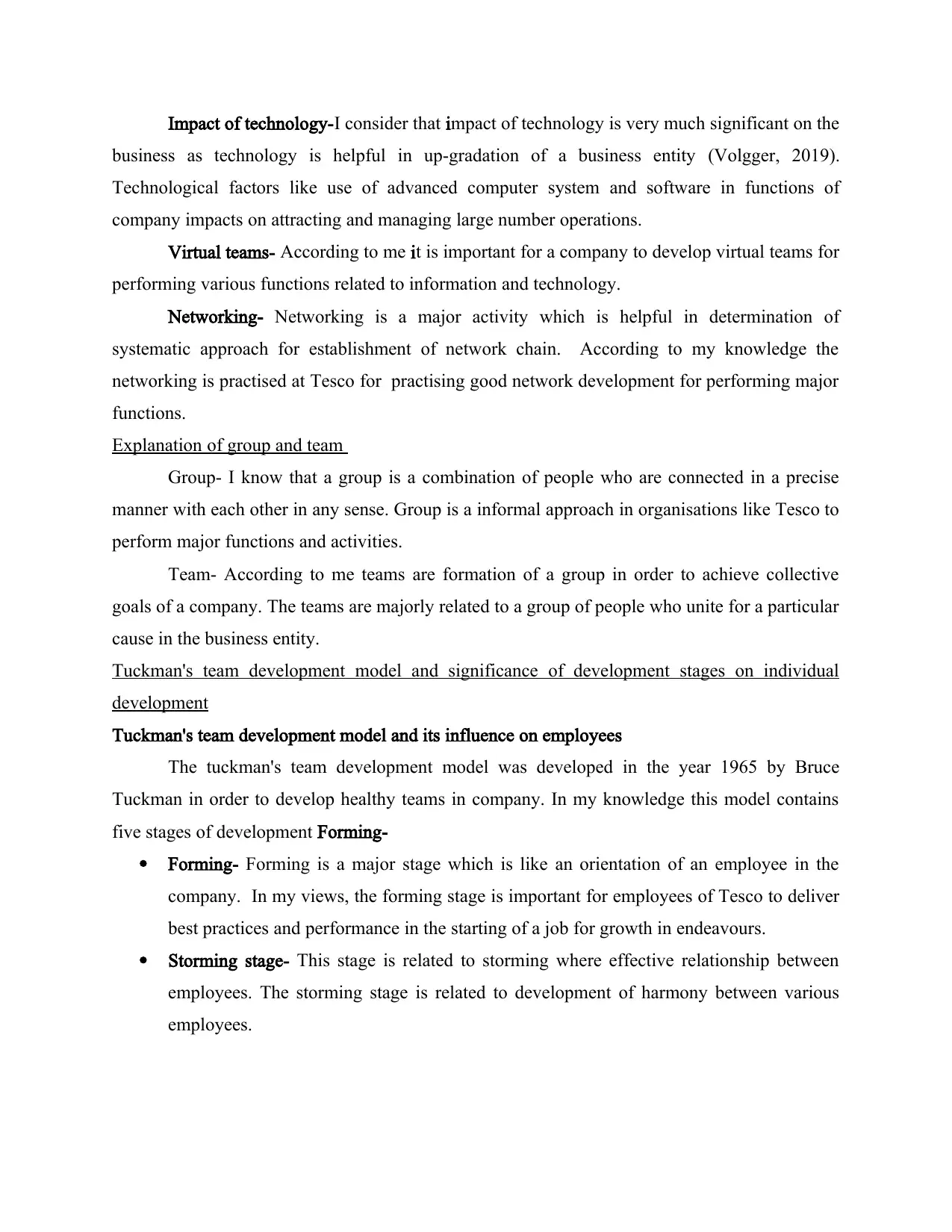
Impact of technology-I consider that impact of technology is very much significant on the
business as technology is helpful in up-gradation of a business entity (Volgger, 2019).
Technological factors like use of advanced computer system and software in functions of
company impacts on attracting and managing large number operations.
Virtual teams- According to me it is important for a company to develop virtual teams for
performing various functions related to information and technology.
Networking- Networking is a major activity which is helpful in determination of
systematic approach for establishment of network chain. According to my knowledge the
networking is practised at Tesco for practising good network development for performing major
functions.
Explanation of group and team
Group- I know that a group is a combination of people who are connected in a precise
manner with each other in any sense. Group is a informal approach in organisations like Tesco to
perform major functions and activities.
Team- According to me teams are formation of a group in order to achieve collective
goals of a company. The teams are majorly related to a group of people who unite for a particular
cause in the business entity.
Tuckman's team development model and significance of development stages on individual
development
Tuckman's team development model and its influence on employees
The tuckman's team development model was developed in the year 1965 by Bruce
Tuckman in order to develop healthy teams in company. In my knowledge this model contains
five stages of development Forming-
Forming- Forming is a major stage which is like an orientation of an employee in the
company. In my views, the forming stage is important for employees of Tesco to deliver
best practices and performance in the starting of a job for growth in endeavours.
Storming stage- This stage is related to storming where effective relationship between
employees. The storming stage is related to development of harmony between various
employees.
business as technology is helpful in up-gradation of a business entity (Volgger, 2019).
Technological factors like use of advanced computer system and software in functions of
company impacts on attracting and managing large number operations.
Virtual teams- According to me it is important for a company to develop virtual teams for
performing various functions related to information and technology.
Networking- Networking is a major activity which is helpful in determination of
systematic approach for establishment of network chain. According to my knowledge the
networking is practised at Tesco for practising good network development for performing major
functions.
Explanation of group and team
Group- I know that a group is a combination of people who are connected in a precise
manner with each other in any sense. Group is a informal approach in organisations like Tesco to
perform major functions and activities.
Team- According to me teams are formation of a group in order to achieve collective
goals of a company. The teams are majorly related to a group of people who unite for a particular
cause in the business entity.
Tuckman's team development model and significance of development stages on individual
development
Tuckman's team development model and its influence on employees
The tuckman's team development model was developed in the year 1965 by Bruce
Tuckman in order to develop healthy teams in company. In my knowledge this model contains
five stages of development Forming-
Forming- Forming is a major stage which is like an orientation of an employee in the
company. In my views, the forming stage is important for employees of Tesco to deliver
best practices and performance in the starting of a job for growth in endeavours.
Storming stage- This stage is related to storming where effective relationship between
employees. The storming stage is related to development of harmony between various
employees.
⊘ This is a preview!⊘
Do you want full access?
Subscribe today to unlock all pages.

Trusted by 1+ million students worldwide
1 out of 20
Related Documents
Your All-in-One AI-Powered Toolkit for Academic Success.
+13062052269
info@desklib.com
Available 24*7 on WhatsApp / Email
![[object Object]](/_next/static/media/star-bottom.7253800d.svg)
Unlock your academic potential
Copyright © 2020–2025 A2Z Services. All Rights Reserved. Developed and managed by ZUCOL.




